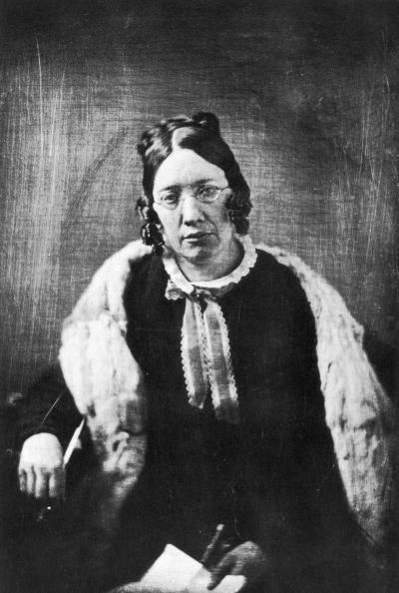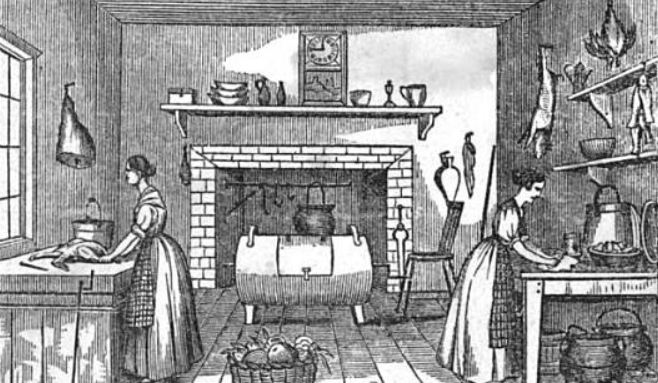Background
A Treatise on Domestic Economy, For the Use of Young Ladies at Home, and At School was written by Catherine E. Beecher and published in 1842. It enjoys the status of its reputation as the “first complete guide to house-keeping published in America.” 1 It was very successful, enjoying three editions between 1842 and 1846. It was also reprinted at least once per year from 1845 until the early 1870’s. Within the text, Beecher describes her Treatise as a textbook that could be beneficial within the classroom of any gender, but mostly meant for young American females.
Thesis
Beecher argues that there is a precise method and study for “domestic economy” in which many young American women remain woefully untrained. She argues that, instead of spending most of her youth in a classroom learning topics that will be unnecessary to her life as an American wife and mother, the young American woman should instead be given time to physically exercise and to learn topics that will be helpful in her life as the center of American domestic life.

Portrait of Catherine Beecher
Notes & Quotes
- Beecher repeatedly stresses the importance of pure, refreshing air to the healthy (bodily and mentally) of human beings. In designing a home, she instructs young women to be mindful of air flow, particularly in the bedrooms. She also instructs classrooms to be constructed so as to admit a healthy supply of fresh air and for young women to have the appropriate amount of time outside so that they can breath in and benefit from the fresh air. This focus on air takes on a particularly American gothic tone when she highlights the fact that American women seem to age and decline in health faster than women from other countries (particularly, Europe). The poor supply of and access to pure air is partly to blame. Therefore, the environment is partly vampirically sapping American women of their vitality, health, beauty, and youth. Beecher also argues that lack of good ventilation in the home can create disease of the brain and mind.
-
And still more care should be given to preserve pure air in the schoolroom. The close stoves, crowded condition, and poisonous air, of most school rooms, act as constant drains on the health and strength of young children….Every pair of lungs is constantly withdrawing from the surrounding atmosphere its healthful principle, and returning one, which is injurious to human life. When, by confinement, and this process, the atmosphere is deprived of its appropriate supply of oxygen, the purification of the blood is interrupted, and it passes, without being properly prepared, into the brain, producing languor, restlessness, and inability to exercise the intellect and feelings.
- I also found Beecher’s argument that American women have greater responsibilities and particular challenges than European women to be really illuminating and helpful in my understanding of 19th century American culture. In particular, her highlighting of the possibility that a woman’s husband may rise or fall many times across his life financially, or that a family may rise or fall many times across generations adds a layer to my understanding of the American dream. In either direction, social and financial mobility can cause American women greater challenges because she must constantly be ready to serve her family in whatever situation they find themselves. She must therefore be trained in many different situations and skills. The same goes for women whose husbands take them to live in different areas of the United States. One particularly haunting image is from a description Beecher includes from Alex de Tocqueville:
-
“By the side of the hearth, sits a woman, with a baby on her lap. She nods to us, without disturbing herself. Like the pioneer, this woman is in the prime of life, her appearance would seem superior to her condition: and her apparel even betrays a lingering taste for dress. But her delicate limbs appear shrunken; her features are drawn in; her eye is mild and melancholy; her whole physiognomy bears marks of a degree of religious resignation, a deep quiet of all passion, and some sort of natural and tranquil firmness, ready to meet all the ills of life, without fearing and without braving them. Her children cluster about her, full of health, turbulence, and energy; they are true children of the wilderness: their mother watches them, from time to time, with mingled melancholy and joy. To look at their strength, and her languor, one might imagine that the life she had given them had exhausted her own; and still she regrets not what they have cost her. The house, inhabited by these emigrants, has no internal partition or loft. In the one chamber of which it consists, the whole family is gathered for the night. The dwelling is itself a little world; an ark of civilization amid an ocean of foliage. A hundred steps beyond it, the primeval forest spreads its shades, and solitude resumes its sway.”
- http://utc.iath.virginia.edu/sentimnt/snescebhp.html ↩
